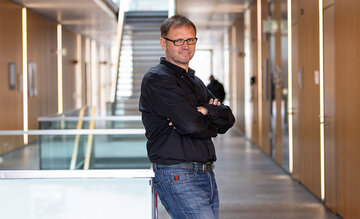Sustainable Mobility Initiatives for Students and Staff of rural Universities
The model project "Sustainable mobility at rural universities" dealt with the mobility situation of the participating universities. In summer semester 2016 an online needs analysis was carried which served as the basis for our new mobility strategy.
The project was coordinated and headed by Prof. Dr. Jochen Baier (WI) and Prof. Dr. Anton Karle (WING).
Project aims:
- Improved public transport: customized to university timetables and needs, local bus service connections
- E-service vehicles: post service, commuting between locations for lectures and meetings
- E-carsharing: electric vehicles to supplement public transport
- Increase of ridesharing: support through use of app for PC and smartphone
- Use of e-bikes: extension of charging infrastructure and parking spaces
- Intermodality: integration of public transport, carsharing and ridesharing in an app for PC and smartphone
Project Partners
Starting point
Universities in rural areas are very important in binding younger, well-educated people to rural areas. They account for a high level of knowledge transfer to rural SMEs contributing to the sustainable supply of skilled employees and thus ultimately to the secure future of our rural areas. The retention of attractive rural university locations must therefore remain central to rural strategy. This includes taking into account the mobility needs of students attending such universities.
Young people have particular mobility needs. They want to be mobile even without a car of their own and want to reach their destination as quickly, cheaply and as simply as possible. It is therefore no accident that the carsharing options which are now well-established in cities are almost exclusively used by young people, who additionally use well-organized public transport systems. Students at rural universities without their own car often encounter difficulties with mobility as generally the public transport system is unsatisfactory, and until now carsharing in rural areas was only available in certain selected areas as part of a model project. Taking Furtwangen University as an example, solutions for a unified, innovative mobility strategy will be developed and examined. Important aspects such as the optimal connection of existing and future mobility options specifically related to target groups will be integrated into the design on the basis of a solid needs analysis.
A further aspect of the model project is related to the specific mobility demands of the two other universities in the region, the Cooperative State University of Baden-Württemberg in Villingen-Schwenningen and the Trossingen University of Music. These demands will also be analyzed and customized solutions will be developed and examined. The approaches worked out will then be checked for viability and integrated into a unified strategy.
EU-wide "NaMolaR" method
Climate change. A word that has almost become part of our everyday lives these days. Sustainability and the reduction of CO2 emissions are always mentioned in this context.
Most CO2 emissions come from the road transport sector, i.e. cars, trucks and buses. With a share of around 25% (2018 - approx. 8.26 billion tons of CO2) of the CO2 emitted worldwide, this is the second largest source of carbon dioxide emissions. [1]
In order to reduce CO2 emissions, research must now focus on sustainable mobility, especially in rural areas in the corresponding transport sector. As many mobility concepts that are implemented in urban areas are difficult or impossible to transfer to rural areas, existing concepts are being rethought or new ones developed. The Sustainable Mobility in Rural Areas project, "NaMolaR" for short, aims to develop a joint project idea with other European universities with precisely this research focus. The central question here is:
"How can the modal split in rural areas, which is currently still very much dominated by motorized private transport, be made more sustainable?"
With NaMolaR, we want to develop an EU-wide method but also further develop and evaluate existing mobility services in order to reduce CO2 emissions in the transport sector in rural areas as far as possible. In this context, we want to collaborate with other colleges and universities in the EU. In connection with the European Green Deal, a suitable call will be identified and a research proposal prepared and submitted.
[1] „Humanity has the ability to make development sustainable – to ensure that it meets the needs of the present without compromising the ability of future generations to meet their own needs.” (Hardtke/Prehn 2001, S.58)
Your key contact
I'm happy to provide information about this project
